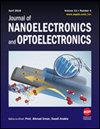Effective Stress Detection and Classification System Using African Buffalo Optimization and Recalling-Enhanced Recurrent Neural Network for Nano-Electronic Typed Data
IF 0.6
4区 工程技术
Q4 ENGINEERING, ELECTRICAL & ELECTRONIC
引用次数: 0
Abstract
A body’s altered emotional reactions to a variety of conditions, including despair, anxiety, rage, grief, guilt, low self-worth, etc., can lead to stress. Stress hurts a person’s performance and is the underlying cause of many mental health issues, including dementia and depression. Numerous prevailing approaches to stress detection are exploited with deep learning, but it needs to categorize the stress precisely, and it takes high computation time. To engulf these complications, an African buffalo optimization and the Recalling-Enhanced Recurrent Neural Network (RE-RNN) are newly proposed for accurately detecting stress. At first, the stress dataset is collected from the Kaggle website, which actually hold the records for the data generated using the nanoelectronic and optoelectronic devices. Afterward, the preprocessing method eliminates noise and improves input data by utilizing adaptive filter method. Next, the preprocessing output is fed to the Feature extraction section. The features are extracted based on discrete wavelet Transform (DWT). After that, the extracted data are updated to the classification process using a Recalling-Enhanced Recurrent Neural Network (RE-RNN) to accurately detect stress. Hence, the African Buffalo Optimization (ABO) is proposed to adjust RE-RNN, which precisely classifies stress detection. The performance of the proposed RE-RNN approach attains 99.89%, 98 98.76 and 98.07% high accuracy, and 0.1%, 0.2%, and 0.2% lower computation Time.针对纳米电子打字数据,使用非洲水牛优化和召回增强递归神经网络,建立有效的压力检测和分类系统
人体对绝望、焦虑、愤怒、悲伤、内疚、自我价值低等各种情况的情绪反应改变,会导致压力。压力会损害人的表现,也是导致痴呆症和抑郁症等许多心理健康问题的根本原因。利用深度学习检测压力的方法有很多,但需要对压力进行精确分类,而且计算时间较长。为了解决这些复杂问题,新近提出了一种非洲水牛优化方法和召回增强递归神经网络(RE-RNN),用于精确检测压力。首先,从 Kaggle 网站上收集压力数据集,该网站实际上保存了使用纳米电子和光电设备产生的数据记录。然后,预处理方法利用自适应滤波器方法消除噪声并改进输入数据。接下来,预处理输出被送入特征提取部分。特征提取基于离散小波变换(DWT)。之后,提取的数据被更新到使用 Recalling-Enhanced Recurrent Neural Network(RE-RNN)的分类过程中,以准确检测压力。因此,提出了非洲水牛优化法(ABO)来调整 RE-RNN,从而对压力检测进行精确分类。所提出的 RE-RNN 方法的准确率分别达到 99.89%、98 98.76 和 98.07%,计算时间分别降低了 0.1%、0.2% 和 0.2%。
本文章由计算机程序翻译,如有差异,请以英文原文为准。
求助全文
约1分钟内获得全文
求助全文
来源期刊

Journal of Nanoelectronics and Optoelectronics
工程技术-工程:电子与电气
自引率
16.70%
发文量
48
审稿时长
12.5 months
文献相关原料
| 公司名称 | 产品信息 | 采购帮参考价格 |
|---|
 求助内容:
求助内容: 应助结果提醒方式:
应助结果提醒方式:


